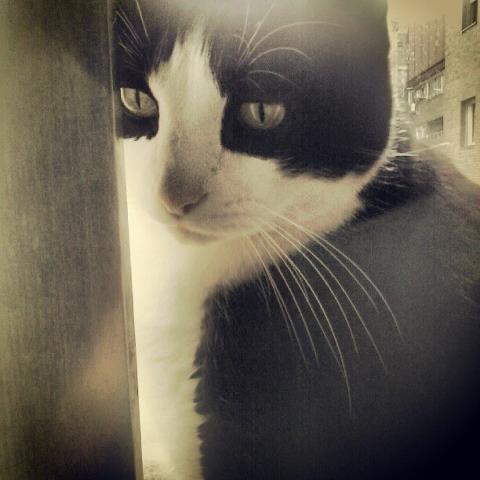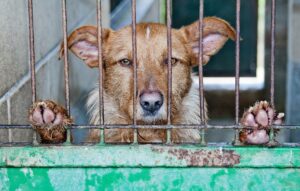
Animal Law Blog
February 26
 Mª Teresa Martín González. A lawyer. Member of the Specialized Group on Environmental and Animal Law of the Granada Bar Association.
Mª Teresa Martín González. A lawyer. Member of the Specialized Group on Environmental and Animal Law of the Granada Bar Association.
The cases that come to our Courts for crimes classified in article 337 of the Penal Code are becoming more and more common, and in turn, events arise more frequently in which abused animals come from overcrowding or even Noe Syndromes. Notwithstanding the health problems or neighborhood nuisances that may arise from these situations, what is evident is that when a person has overcrowded animals, their health is impaired. When I speak of overcrowding, I am not referring to a group of animals that reside in places enabled for it, shelters or even shelters that take care of animals with their appropriate spaces, quarantine places and a feeding and veterinary protocols according to the needs of Not each animal, I mean those situations in which the person holding the animal keeps them in his possession in large numbers (sometimes in places where space is reduced compared to the number of members), even relaxing the basic care and essential for the welfare of the animal.
Overcrowding of animals
Overcrowding of animals is understood, essentially when dealing with animal welfare, the situation in which there is an accumulation of animals in the same place, which is not conditioned so that all individuals have a minimum space in which to move comfortably or meet your basic and recreational needs. This usually leads to hygiene problems, lack of ventilation, food mixed with feces, lowered defenses, spread of infectious-contagious diseases, fights, stress, and in the worst cases, death.
As of today, we do not have a framework rule that regulates animal ownership and protection at the state level. The competence in this matter corresponds to each Autonomous Community. The regulations of the Autonomous Communities, as well as municipal ordinances, tend to establish measures on the number of domestic animals, either by indicating guidelines to make it compatible with public health and citizen security, or by imposing a limit. maximum. In this way, it is intended to avoid that the accumulation of animals can lead to a health problem, not only for the animals, but also for the people who live with them or for the neighbors. Among the animal protection laws that do not determine an exact number, but do include the need for each animal to have a space to develop and live comfortably, we have, for example, Law 11/2003, of November 24, on protection of the animals of Andalusia, which in its article 10 indicates that the keeping of pets in homes or private enclosures is conditioned "To the space, the hygienic-sanitary circumstances for their accommodation and the ethological needs of each species and race". Law 4/2017 of October 3, on the protection and welfare of companion animals in Galicia, also states in its article 21.2 that "The keeping of domestic animals in enclosures or private homes is conditioned to the ethological needs of each species and race, to the space, to the optimal hygienic circumstances and to the adoption of adequate security measures, ...", but it goes further, and when it regulates foster homes, it indicates that a maximum number of animals that may be accommodated in the same home will be established by regulation (art. 25). Law 4/2016, of July 22, on the Protection of Companion Animals of the Community of Madrid, in its article 6.1.a) states that the owners and in general all those people who keep or enjoy companion animals, should provide you with a "Sufficient, hygienic and adequate space to live, in accordance with their ethological needs and destiny, ...", for then in the Regulatory Ordinance of the Ownership and Protection of Animals of Madrid, determines in article 4 that in the case of dogs and cats may not exceed five animals in their entirety without the corresponding authorization of the competent services of the City Council .
In one way or another, all the regulations on this matter in terms of domestic animals, maintain as a reflection of animal welfare that they have a space for recreation, safety and well-being, whether they are private homes, rescue or reception centers, veterinary clinics or sales centers.
Veterinary professionals do not show any doubt that situations of overcrowding of animals lead to poor hygiene conditions and a public health problem, which in many cases leads to a situation of malnutrition, lack of assistance and non-compliance with veterinary protocols , infectious diseases, creating a completely insane place for any of the members that are part of that animal community.
Noah Syndrome
When the overcrowding of animals goes hand in hand with a situation, on the part of the holder, of a lack of both financial and personal resources to take care of the animals in their care, we find what in psychiatry they call Animal Hoarding Disorder, or better known as Noah's Syndrome. The normal thing is that the accumulation of animals occurs in the very property in which the owner resides, which considerably increases the risk for animals and for humans, since, frequently, the house also remains in an absolute neglect together to the own waste that the accumulator is generating daily.
Sometimes this disorder coexists with other mental disorders, the most common symptoms of the syndrome being: an accumulation of animals (whether in places with large spaces or not) coupled with an inability to adequately maintain them and meet their needs; a situation of hygienic-sanitary risk in the residence of the accumulator person; denial of the problem, the accumulator being unable to realize the state in which the animals are.
 The person affected by this disorder accumulates animals in order to rescue them from the street, save them, give them a home, but acaIt has kept them in terrible conditions, with an absolute lack of veterinary and sanitary treatments, malnutrition, parasitic loads, and in many cases causing death or taking them to a state such that when the authorities intervene they can only procure a dignified death. However, such people continue to perceive themselves as animal lovers, empaths, saviors, having an absolute distortion of reality.
The person affected by this disorder accumulates animals in order to rescue them from the street, save them, give them a home, but acaIt has kept them in terrible conditions, with an absolute lack of veterinary and sanitary treatments, malnutrition, parasitic loads, and in many cases causing death or taking them to a state such that when the authorities intervene they can only procure a dignified death. However, such people continue to perceive themselves as animal lovers, empaths, saviors, having an absolute distortion of reality.
Mainly cats and dogs are the victims of these situations and the causes of their ills usually refuse to give them up despite the evidence when the authorities already intervene.
The commission by omission. Eventual fraud in the crime of art. 337 of the Penal Code.
The crime of animal abuse, contained in article 337 of the Penal Code, in its first section establishes a penalty for those who "By any means or procedure mistreat unjustifiably"Therefore, the commission of this crime can not only occur when there is an attack on an animal (hitting an object, kicking, burns, etc.), but also when the conduct consists of a neglect of basic care: not offering water and food to the animals, keeping them in such small or crowded spaces in such a way as to endanger their lives, lack of hygiene, not treating their wounds, letting them fight each other, etc. We are then before a commission by omission, where the guarantor of the welfare of the animals fails to comply with the most basic obligations of care or even other obligations (most of them included in the administrative regulations of animal protection), which together and together, provoke in the affected animal has a physical or mental problem.
Article 11 of the Penal Code establishes that crimes that consist in the production of a result will only be understood to have been committed by omission when failure to avoid it, by infringing a special legal duty of the author, is equivalent, according to the meaning of the text of the law, to its causation. Therefore, the omission will be equated to the action when there is a specific legal or contractual obligation to act, or when the omitent has created an occasion of risk for the legally protected asset through a preceding action or omission.
The commission by omission has been reflected in the Jurisprudence, in resolutions such as the Sentence of the AP Madrid 722/2017, of December 14, which indicates “Animal abuse is a malicious crime that can occur in criminal continuity […] jurisprudence has included in article 337 of the Code the cases of lack of attention and care of animals, provided that the required result of injuries occurs ( SAP de Zaragoza, Sec. 6ª, 69/2015, of February 10), as well as in the event that death or injuries that seriously undermine the health of the domestic or tamed animal occurs as a result, being able to fit within the criminal type behaviors such as stopping feeding the animal which causes death or injury (SAP Cáceres, Sec. 2ª, 231/2012 of June 15) ”. The Sentence of the AP of Granada (Section 1), of March 13, 2020, includes: “With his omissionate behavior, he caused serious physical damage to the animals, seventeen, for which he was responsible, for which he was in a legal position as guarantor, impairments, injuries that seriously undermine their health, injuries expressly declared proven, resulting as serious abuse by action, as neglect, neglect or omission, if the typical result occurs. The appellant had no obligation to collect, accept and take in the animals, but, once he did so, freely, he acquired the clear obligation to support and care for them even minimally from the criminal point of view, providing them with food, water, relationship , veterinary care, activity and habitat that would avoid causing the serious detrimental results of their bodily integrity declared reasonably proven, and that make up the crime, as a result, for which they have been convicted, harmful results that seriously undermine the health of the animals , linked in a causal relationship with their previous omissionate and malicious behavior ”.
Situations such as Noah's Syndrome, draw us a reality that would cause rejection to any citizen. From the legal perspective, it is not the first time that this type of disorder has been used in cases of accumulation and lack of care, precisely as a defense weapon. There is a very weak line that is sometimes crossed without the accumulator itself being aware of it. How serious can such a disorder be that it can lead to an acquittal? I understand that it should only depend on an expert test of psychological evaluation or forensic report with specific training, which determines the degree of affectation and if acaso, the existence of other disorders of sufficient importance, which affect the understanding of the acts carried out as well as their freedom of will and therefore have an effect on responsibility. However, not all cases of overcrowding and neglect are Noah's Syndromes.
In any case, and being more than likely that the person affected by Noah's Syndrome did not want that situation, and that his initial intention was to give a home to the animals, we find an omission of due diligence in the care of the animals. animals, and as such deserves criminal reproach. Despite the fact that the crime of animal abuse does not include the commission due to recklessness, and requires fraud as a subjective element of the unjust, the appreciation of eventual fraud allows situations such as those described to end in a conviction.
In the eventual intent, the individual, even if he does not want the result, sees it as probable. A danger is being generated for these animals, and even if the causation of a result is not pursued, that is, damage or even death, it is understandable by the subject that maintaining this behavior is harmful to the animals, and even hoping that it will not happens (because he thinks they are his animals and as such he takes care of them better than someone else or they are better than on the street) has not prevented the result. That is, the result has not been avoided by the caregiver, a typical result, having infringed a special legal duty that was required of him.
Responsible ownership, animal welfare and therefore the coexistence between humans and domestic animals with whom they share space, is protected both at an administrative and criminal level, although it is clearly insufficient to avoid situations such as overcrowding or syndromes. of Noah, which occur with increasing frequency.